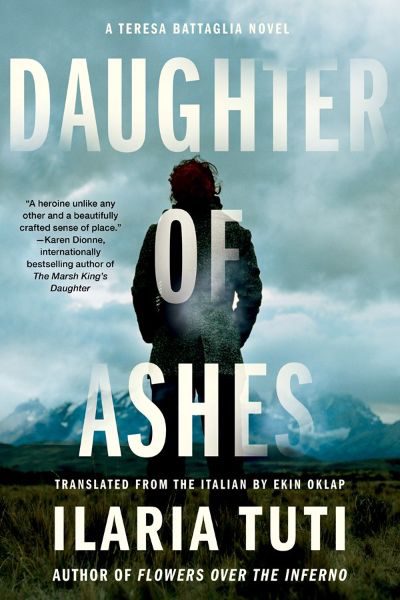A classic—but in no way cliched—cozy that features a great lead, a best friend, murder(s), two uniformed love interests, a good dollop of gossip, and a bloodhound that pretty much steals the story. Priscilla (aka Pris) is a former teacher who just published her first children’s book, The Adventures of Bailey the Bloodhound, which has landed on the bestseller list. She’s now in the process of moving back to her hometown of Crosbyville, Indiana to finish the series when she comes across the mean girl to end all mean girls, Louboutin- and Givenchy-clad Whitney Kelley. Whitney is on the school board, and she can’t help but mouth off about everything she’s planning to cut—like social programs and art—and Paris’s favorite: a pet-assisted reading program (guess who stars in that?). Have no doubt, words are exchanged! Flip to the next morning, when Bailey and Pris are off on their walk, although Bailey won’t stop pulling Pris over to the begonia bed…and a very dead Whitney, face-down in the plantings. Readers will love this down-to-earth lead, big-time problems in a small town world, and the consistently fast pace of the narrative. Cozy fans may know Kallie E. Benjamin as V. M. Burns, the author of the Mystery Bookshop Mystery, Dog Club Mystery, RJ Franklin Mystery, and Baker Street Mystery series.
Mystery & Detective
James L’Etoile uses his time working for the prison and criminal justice system to maximum effect at the start of this series featuring Detective Emily Hunter and her partner, Javier Medina. A businessman with ties to the Sacramento community is murdered in his home, and his wife is injured. The mayor wants answers and pressures Emily’s Captain to uncover the truth while ordering them to stay away from his widow. As the investigation progresses, the widow seems to have the answers they seek, but Emily and Javier risk being tossed off the case if they continue to prod her. More bodies start to appear, and a break-in reflects poorly on the dead businessman and his unscrupulous methods to maintain his job and charitable contributions. It doesn’t help that Emily is distracted by a family matter that seems to lead to a conclusion she cannot accept. The pacing and realistic feel of the investigation will appeal to fans of Michael Connelly, who enjoy a baffling crime to solve. Readers will be anxious for Emily’s next case.
This is the final book in Tuti’s stunning and disturbing trilogy starring police detective Teresa Battaglia and set in the Dolomite mountains of northern Italy. Teresa has always been an extraordinary character, a woman who fought her way up the police ladder—while suffering the ridicule of her male peers—and at the same time found herself caught in an abusive marriage that nearly killed her. Now in her early sixties, she has slowly acknowledged that she has Alzheimer’s, and in this book we see it beginning to dominate her life. But just as she is about to retire, Teresa is brought back to work on a case featuring Giacomo Mainardi, a serial killer she confronted 27 years ago, whose mind she has come to understand and whose soul she has come to respect. While very much the tale of a serial killer, this final volume finds Teresa finally accepting the love and support of her colleagues, putting aside the “thick and steely…armor she wore every day,” and acknowledging that she has paved “the way for all the other women who would follow, and for anybody—regardless of their sex—who might be vulnerable to being victimized by people in position of power.” Best to read this brilliant series in order, beginning with Flowers over the Inferno.
The perfect introduction to the delightful Berenson, this volume brings together two previously published novellas—and five standard poodles!—set during Christmas in Connecticut. Narrated by the funny yet tough Melanie Travis, the first novella, Wagging Through the Snow, features Melanie’s brother, who spontaneously purchases a deserted Christmas tree farm without discussing the sale with anyone, including his business partner. When the family goes to check out the farm, they stumble across a corpse tucked into a drift of snow. Could things get any worse? Yes, and when Melanie, assisted by the ever-present curmudgeon Aunt Peg, starts to ask questions, motives abound. In Here Comes Santa Paws, Melanie gets a call from Claire, her good friend (and wife of Melanie’s ex-husband…it’s complicated), asking her to meet up at a client’s house. Melanie arrives at the home only to find the client, dead, lying in a pool of blood, and Claire waiting to be interrogated by the cops. Claire is acting weird—not that she doesn’t have every right to be upset—but once the cops are done with her she jumps in her car and races away without a word to Melanie. What’s going on? Leave it to Melanie and Aunt Peg to get to the bottom of the mystery. Lucky readers just discovering Melanie, her dogs, and her family have several armfuls of books to enjoy.
No sooner does San Francisco bookbinder Brooklyn Wainwright get a break from sleuthing at a Scottish castle than she’s invited back to Scotland for a wedding and must again save the day. On Christmas Eve, Brooklyn gets a call announcing that her friends Claire and Cameron—Laird McKinnon, thank you—are getting married in a week. Brooklyn, her partner, and her parents are soon off to Castle McKinnon, on the shore of Loch Ness. At first only Brooklyn’s (meticulously described) book-restoring skills are in demand, as the bride-to-be wants a precious volume from the castle’s extensive library repaired for her beau. Then Claire also confides that 12 books, all of them set at Christmas and some very valuable, are missing from the shelves. But that investigation soon takes a back seat as a young man who works at the castle is found dead, not the last to meet a sad end. There’s a lot packed in here, from yummy food descriptions (there might also be a drink or two) to a family whose members are intent on grabbing a noble title and from archery competitions to Scotland’s Hogmanay traditions. It all comes together beautifully to create an atmospheric puzzle that fans of the author and newcomers will find festive and engaging.
Rudolph, New York is one of those unique places where the holidays are celebrated 24/7/365. In fact, the town has branded itself as America’s Christmas town, and nearly every shop in the bustling downtown caters to some type of holiday need, including Mrs. Claus’s Treasures, the gift shop owned by our narrator, Merry Wilkinson. This holiday season, the town is in a lather over the local amateur production of the musical version of “A Christmas Carol,” with Aline, Merry’s mom, a retired opera singer, taking the lead role. From the leadership down to the cast and crew, rivalries abound and nearly everyone has an ax to grind. But when one of the cast members is found dead in Merry’s shop, everyone starts to look guilty, including Aline. This is an expansive cozy—with quite a number of characters floating about—but Delany never allows the reader to become overwhelmed. Fans of Donna Andrews will love this sixth installment in the series.
Yes, I would happily move to Larch Haven, Vermont—and after 20 pages in this book, you would too. Except, perhaps, for the slight issue with murder. Former actress Becca Ransom has taken up a new career as a chocolatier and moved back to hometown Larch Haven. All is going super—relatives are actually helpful, she has a best friend she can rely on—until she is cajoled into entering the Baking Spirits Bright holiday baking competition. Turns out this annual event isn’t just popular, it’s a beacon for the seriously anxious and unpleasant…one of whom ends up murdered, killed with Becca’s own chocolate chipper (ouch! It’s a six-pronged device used to break up chocolate or ice. Look it up.) We know the drill: Becca needs to solve the mystery to clear her record. But with a cute cop in her court, I wasn’t too worried. A fun, classic holiday cozy that features a great cast of characters.
Alex Wright and her sister, Hanna Eastham, co-owners of Murder and Mayhem: Killer Chocolates and Bookshop, are hard at work preparing goodies in their Montana store for the Festive Foods Chocolates Competition. It’s just their luck that at the same time as they’re hard at work preparing sweets for the local high-school reunion they’re also smack in the middle of their busiest season, the winter holidays. Still, they’re muddling through until a murder at the reunion stops the community in its tracks. A man who was unpopular in school and has increased his enemy count by being “gropey” at the reunion (Hanna suspects he has “an octopus in his bloodline”) meets his not-so-sweet end. And unbelievably, Hanna is suspected in the killing. The elements we love in a cozy are all here: tight family relationships, romantic interests with law enforcement, off-screen killings, food, and bookstores. What’s not to love? This one has rich characterization to boot and a story that will keep readers guessing till the last Strychnine Strawberry chocolate is but a gooey memory.
Keigo Higashino makes the unbelievable become credible in this expansive novel that takes an extremely personal turn. After leaving her husband and son behind a decade ago, the mother of Tokyo Police Detective Kyoichiro Kaga lived out a quiet life in remote Sendai. Kaga only learned of her location after her death, and while sorting through her meager possessions and interviewing her one friend, he gains no answers to the many questions he has about his mother’s disappearance and life. Today, sixteen years later, Kaga is investigating the murder of Michiko Oshitani, a resident of Sendai who is found strangled to death in Tokyo—a place where she has no known connections. Why was Oshitani in Tokyo? With the help of his cousin, also a police detective, Kaga follows a series of twists and turns to finally arrive at a connection between Oshitani’s murder and the death of his mother that is absolutely staggering. Beautifully written and superbly translated, this is the concluding volume to a brilliant four-part series, and the plunge into Kaga’s personal life makes this title especially satisfying.
This strange, beautiful tale wedges readers into the crowded boats and alleys of Venice while whisking them along on a three-day romance with a Roman princess and the down-at-heel tour guide she falls for. The two seem to float above the city’s watery fray even before meeting. After meeting, they withdraw completely into their own emotional realm, “literally liquefied” by their fascination and passion for each other. Time is immaterial, they agree, as they find themselves “precariously suspended between being and non-being,” contemplate “intimate perplexities on who is who, where the I ends and the you begins,” and eat “a variety of little inventions.” The love story, which as the translator’s note explains, features more robustly in the book than the crime tale related to the princess’s work as an art dealer, soon provokes questions in the reader. Where is the tour guide from? Why must he leave Venice despite his grief over losing the love he has just stumbled upon? The answer to the mystery is startling and brings up many questions about the nature of life and how the past, and past injustices, can resonate today. Try this after Danielle Trussoni’s The Puzzle Master; you’ll come back to Earth eventually










